英语短语介词用法附例句
小学英语介词短语(好)
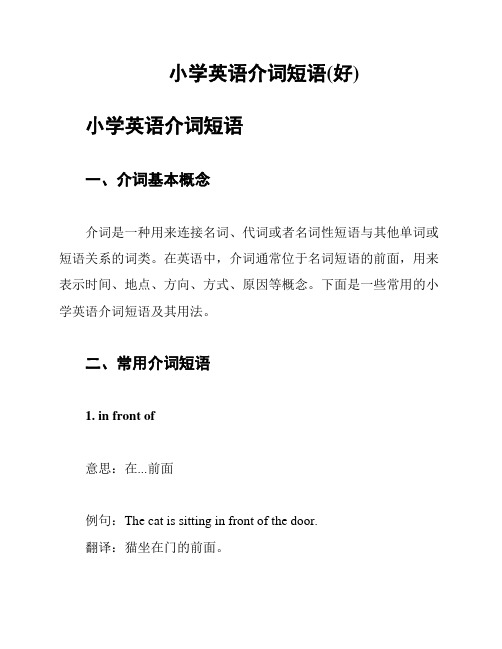
小学英语介词短语(好)小学英语介词短语一、介词基本概念介词是一种用来连接名词、代词或者名词性短语与其他单词或短语关系的词类。
在英语中,介词通常位于名词短语的前面,用来表示时间、地点、方向、方式、原因等概念。
下面是一些常用的小学英语介词短语及其用法。
二、常用介词短语1. in front of意思:在...前面例句:The cat is sitting in front of the door.翻译:猫坐在门的前面。
2. at school意思:在学校例句:I study English at school.翻译:我在学校学英语。
3. on the table意思:在桌子上例句:The book is on the table.翻译:书在桌子上。
4. under the tree意思:在树下例句:We had a picnic under the tree. 翻译:我们在树下野餐。
5. with a friend意思:和朋友在一起例句:I like playing soccer with a friend. 翻译:我喜欢和朋友一起踢足球。
6. by the beach意思:在海滩旁边例句:They built sandcastles by the beach. 翻译:他们在海滩旁边堆沙堡。
7. for breakfast意思:作为早餐例句:I had cereal for breakfast.翻译:我吃了谷物当早餐。
8. after school意思:放学后例句:Let's go to the park after school. 翻译:放学后我们去公园。
9. in the morning意思:在早晨例句:I like to jog in the morning.翻译:我喜欢早晨慢跑。
10. with a smile意思:带着微笑例句:She always greets everyone with a smile.翻译:她总是带着微笑向每个人打招呼。
介词的常见用法与例句分析

介词的常见用法与例句分析介词是英语语法中十分重要的一部分,用来表示各种关系,连接其他词或短语。
在句子中,介词通常位于名词、代词、动词、形容词或副词之前,并指示它们之间的关系。
本文将介绍常见的介词用法,并给出相应的例句分析。
一、表示时间关系的介词1. "at"用于表示具体的时间点:- I will meet you at 7 o'clock.- We're having a party at the weekend.2. "on"用于表示具体的日期或星期:- She was born on January 1st, 1990.- We have a meeting on Monday.3. "in"用于表示较长的时间段:- I will finish this project in a month.- He went to Australia in 2010.二、表示地点关系的介词1. "in"表示大的范围或区域内:- The library is in the city center.- She lives in the United States.2. "on"表示接触或靠在某个表面上:- The book is on the table.- The picture is on the wall.3. "at"表示准确的位置:- I'm waiting for you at the bus stop.- They met at the park.三、表示移动方向的介词1. "to"表示向一个地点或目的地移动:- She walked to the store.- He is going to Paris.2. "from"表示从一个地点离开:- They came from Japan.- He returned from school.3. "through"表示穿过或经由某处:- We walked through the forest.- The road goes through the mountains.四、表示原因或目的的介词1. "for"表示目的或原因:- We go to school for education.- She bought flowers for her mother.2. "because of"表示因为:- The game was canceled because of the rain. - He was late because of the traffic jam.3. "with"表示伴随:- He went to the party with his friends.- She took a walk with her dog.五、表示方式或手段的介词1. "by"表示通过某种方式或手段:- We can travel by car.- He learned English by watching movies. 2. "with"表示使用某物或与某人合作:- He writes with a pen.- She painted the picture with watercolors.六、表示比较或对比的介词1. "than"表示比较级:- She is taller than her sister.- It's colder today than yesterday.2. "as"表示相同程度或相似性:- He is as tall as his father.- This book is as interesting as the previous one.七、其他常用介词1. "of"表示所属关系或材料:- The top of the mountain is covered with snow.- She made a doll out of clay.2. "at"表示注意或特定情况下:- Look at the beautiful sunset!- He was surprised at the news.3. "to"表示关系或方向:- She is nice to her colleagues.- He gave the book to me.总结:通过以上介词的常见用法与例句分析,我们可以看到介词在句子中承担着重要的作用,帮助我们准确表达时间、地点、移动方向、目的、方式、比较等关系。
初中英语 初中实用介词短语(附例句)
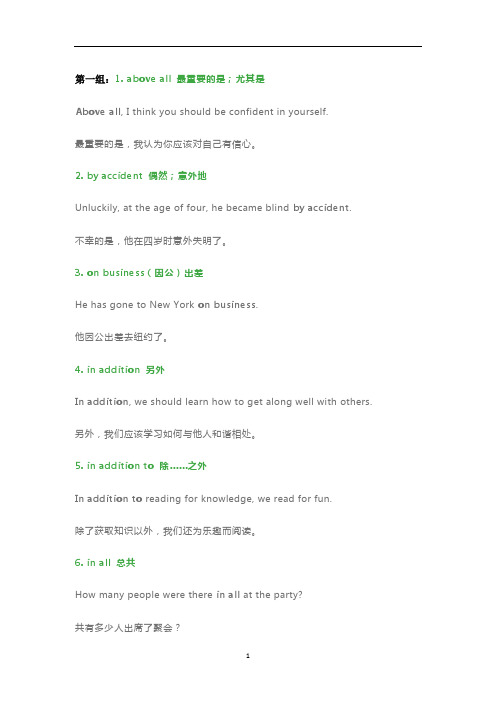
第一组:1. above all 最重要的是;尤其是Above all, I think you should be confident in yourself.最重要的是,我认为你应该对自己有信心。
2. by accident 偶然;意外地Unluckily, at the age of four, he became blind by accident.不幸的是,他在四岁时意外失明了。
3. on business(因公)出差He has gone to New York on business.他因公出差去纽约了。
4. in addition 另外In addition, we should learn how to get along well with others.另外,我们应该学习如何与他人和谐相处。
5. in addition to 除……之外In addition to reading for knowledge, we read for fun.除了获取知识以外,我们还为乐趣而阅读。
6. in all 总共How many people were there in all at the party?共有多少人出席了聚会?7. on average 平均;一般地Chinese workers have only ten days of paid leave on average.中国劳动者平均只有10天带薪假期。
8. at / in / from the beginning 在开始的时候English is difficult to learn at the beginning.英语一开始很难学。
Vincent van Gogh was not a painter from the beginning.起初,文森特·梵高并不是画家。
9. at the beginning of 在……开始In China, we start our summer vacation at the beginning of July.在中国,我们七月初开始放暑假。
介词短语的表达
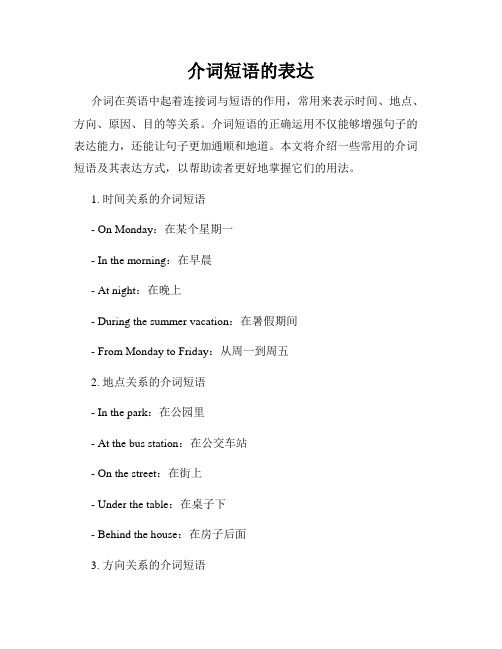
介词短语的表达介词在英语中起着连接词与短语的作用,常用来表示时间、地点、方向、原因、目的等关系。
介词短语的正确运用不仅能够增强句子的表达能力,还能让句子更加通顺和地道。
本文将介绍一些常用的介词短语及其表达方式,以帮助读者更好地掌握它们的用法。
1. 时间关系的介词短语- On Monday:在某个星期一- In the morning:在早晨- At night:在晚上- During the summer vacation:在暑假期间- From Monday to Friday:从周一到周五2. 地点关系的介词短语- In the park:在公园里- At the bus station:在公交车站- On the street:在街上- Under the table:在桌子下- Behind the house:在房子后面3. 方向关系的介词短语- To the left:向左边- To the right:向右边- Upstairs:上楼- Downstairs:下楼- Across the bridge:穿过桥4. 原因关系的介词短语- Because of:因为- Due to:由于- Thanks to:由于,多亏了- As a result of:由于- Owing to:由于5. 目的关系的介词短语- For the purpose of:为了...的目的- With the aim of:以...为目标- In order to:为了- So as to:以便- With the intention of:为了6. 其他常见介词短语- In addition to:除了...之外- In the middle of:在...的中间- In front of:在...前面- On top of:在...顶部- By means of:借助于总结:介词短语在英语中具有重要的作用,它们可以帮助我们表达时间、地点、方向、原因、目的等关系。
高中英语知识点归纳介词短语和动词短语的搭配
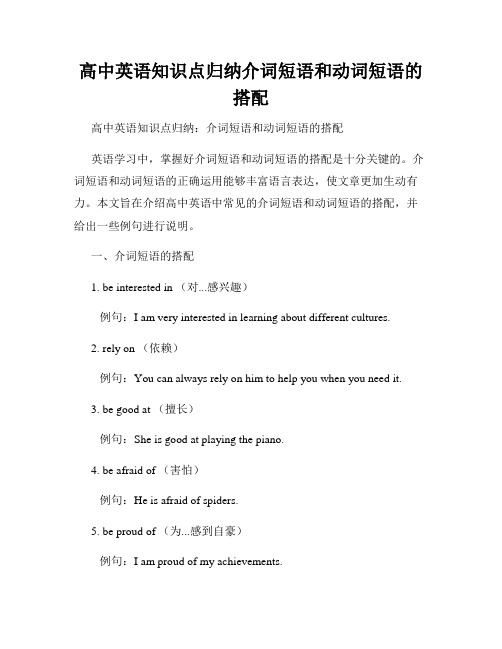
高中英语知识点归纳介词短语和动词短语的搭配高中英语知识点归纳:介词短语和动词短语的搭配英语学习中,掌握好介词短语和动词短语的搭配是十分关键的。
介词短语和动词短语的正确运用能够丰富语言表达,使文章更加生动有力。
本文旨在介绍高中英语中常见的介词短语和动词短语的搭配,并给出一些例句进行说明。
一、介词短语的搭配1. be interested in (对...感兴趣)例句:I am very interested in learning about different cultures.2. rely on (依赖)例句:You can always rely on him to help you when you need it.3. be good at (擅长)例句:She is good at playing the piano.4. be afraid of (害怕)例句:He is afraid of spiders.5. be proud of (为...感到自豪)例句:I am proud of my achievements.6. be similar to (类似于)例句:This dress is similar to the one she wore to the party.7. be different from (不同于)例句:His opinion is different from mine.8. be keen on (热衷于)例句:She is keen on playing basketball.9. be famous for (因...而闻名)例句:Paris is famous for its beautiful architecture.10. be worried about (为...担心)例句:My parents are worried about my exam results.二、动词短语的搭配1. take part in (参加)例句:She took part in the school talent show.2. get along with (与...相处)例句:He gets along well with his classmates.3. look forward to (期待)例句:I am looking forward to my summer vacation.4. give up (放弃)例句:Don't give up easily when faced with difficulties.5. come up with (提出,想出)例句:He always comes up with creative ideas.6. make up (弥补)例句:I need to make up for the time I wasted.7. put off (推迟)例句:The meeting has been put off until next week.8. get used to (习惯于)例句:It took me some time to get used to the new environment.9. look up (查阅)例句:You can look up the meaning of unknown words in the dictionary.10. break up (分手)例句:They decided to break up after years of being together.三、总结通过本文的介绍,我们了解了高中英语中常见的介词短语和动词短语的搭配。
介词用法总结

介词用法总结介词是英语语法中一个重要的词类,用于表示名词、代词、动词和形容词等与其他词或短语之间的关系。
在不同的句子和语境中,介词具有不同的用法。
本文将对介词的用法进行总结,并提供相关的例句。
一、表示位置关系的介词1. in:在…之中,在(具体范围)。
例句:He is waiting in the car.(他正在车里等待。
)2. on:在…之上,在(水平面)。
例句:The book is on the table.(书在桌子上。
)3. at:在…地方,在(具体点)。
例句:She is studying at the library.(她在图书馆学习。
)4. by:在…旁边,靠近(某物)。
例句:He is standing by the door.(他站在门旁边。
)5. under:在…下面,在(某物)的底部。
例句:The cat is hiding under the bed.(猫在床下躲藏。
)6. between:在…之间(两者之间)。
例句:The restaurant is located between the bank and the supermarket.(这家餐厅位于银行和超市之间。
)二、表示时间关系的介词1. at:在(具体时间点)。
例句:She will meet her friend at 8 o'clock.(她将在8点钟见她的朋友。
)2. on:在(具体日期或星期)。
例句:I have a meeting on Monday.(星期一我有个会议。
)3. in:在(一段时间内)。
例句:He will travel to Europe in summer.(他将在夏天去欧洲旅行。
)4. during:在…期间,表示全程。
例句:I read a book during the flight.(我在飞行途中读了一本书。
)5. for:持续时间,表示时间段。
例句:They have been married for ten years.(他们已经结婚十年了。
介词短语的用法和搭配

介词短语的用法和搭配介词短语在英语中扮演着重要的角色,能够丰富句子的意思、表达关系以及提供更多的细节。
本文将详细介绍介词短语的用法和搭配,帮助读者更好地理解和运用这一语法结构。
一、介词的基本概念和功能介词是连接名词、代词或者动名词与其他词汇之间关系的词语。
它常常表示时间、地点、目的、原因、方式、条件等概念,并起到限定和修饰的作用。
1. 表示时间:例如in(在)、on(在某天)、at(在某一时刻)、during(在...期间)等。
例句:I will meet you at the park tomorrow.(我明天会在公园见你。
)2. 表示地点:例如in(在...里面)、on(在...上)、at(在...处)、by(在...旁边)、behind(在...后面)、under(在...下面)等。
例句:The book is on the table.(书在桌子上。
)3. 表示目的:例如for(为了)、to(到...去)、with(带着)等。
例句:He went to the supermarket to buy some groceries.(他去超市买杂货。
)4. 表示原因:例如because of(因为)、due to(由于)等。
例句:She was late for the meeting because of heavy traffic.(她因为交通拥堵而迟到了会议。
)5. 表示方式:例如by(通过)、with(用)等。
例句:He achieved success by working hard.(他通过努力工作取得了成功。
)6. 表示条件:例如if(如果)、unless(除非)等。
例句:I will go hiking tomorrow if the weather is good.(如果天气好的话,我明天会去徒步旅行。
)二、介词短语的搭配介词短语的搭配是指介词与特定名词、动词或形容词之间的固定组合。
英语介词用法及例句【全】
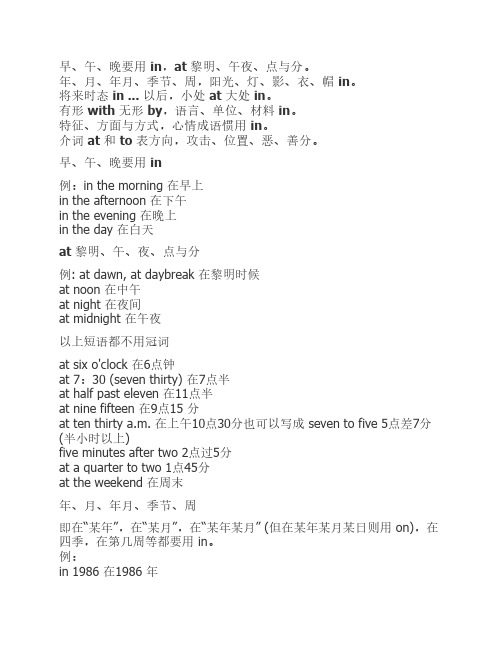
早、午、晚要用 in,at 黎明、午夜、点与分。
年、月、年月、季节、周,阳光、灯、影、衣、帽 in。
将来时态 in ... 以后,小处 at 大处 in。
有形 with 无形 by,语言、单位、材料 in。
特征、方面与方式,心情成语惯用 in。
介词 at 和 to 表方向,攻击、位置、恶、善分。
早、午、晚要用 in例:in the morning 在早上in the afternoon 在下午in the evening 在晚上in the day 在白天at 黎明、午、夜、点与分例: at dawn, at daybreak 在黎明时候at noon 在中午at night 在夜间at midnight 在午夜以上短语都不用冠词at six o'clock 在6点钟at 7:30 (seven thirty) 在7点半at half past eleven 在11点半at nine fifteen 在9点15 分at ten thirty a.m. 在上午10点30分也可以写成 seven to five 5点差7分(半小时以上)five minutes after two 2点过5分at a quarter to two 1点45分at the weekend 在周末年、月、年月、季节、周即在“某年”,在“某月”,在“某年某月” (但在某年某月某日则用 on),在四季,在第几周等都要用 in。
例:in 1986 在1986 年in 1927 在1927 年in April 在四月in March 在三月in December, 1986 1986年12月in July, l983 1983年7月in spring 在春季 in summer 在夏季in autumn 在秋季 in winter 在冬季in the fist week of this semester 这学期的第一周in the third week 在第三周阳光、灯、影、衣、冒 in,即在阳光下,在灯下,在树阴下,穿衣、着装、冒雨等都要用 in。
- 1、下载文档前请自行甄别文档内容的完整性,平台不提供额外的编辑、内容补充、找答案等附加服务。
- 2、"仅部分预览"的文档,不可在线预览部分如存在完整性等问题,可反馈申请退款(可完整预览的文档不适用该条件!)。
- 3、如文档侵犯您的权益,请联系客服反馈,我们会尽快为您处理(人工客服工作时间:9:00-18:30)。
英语短语介词用法附例句
早、午、晚要用in,at 黎明、午夜、点与分。
年、月、年月、季节、周,阳光、灯、影、衣、帽in。
将来时态in ... 以后,小处at 大处in。
有形with 无形by,语言、单位、材料in。
特征、方面与方式,心情成语惯用in。
介词at 和to 表方向,攻击、位置、恶、善分。
早、午、晚要用in
例:in the morning 在早上
in the afternoon 在下午
in the evening 在晚上
in the day 在白天
at 黎明、午、夜、点与分
例: at dawn, at daybreak 在黎明时候
at noon 在中午
at night 在夜间
at midnight 在午夜
以上短语都不用冠词
at six o'clock 在6点钟
at 7:30 (seven thirty) 在7点半
at half past eleven 在11点半
at nine fifteen 在9点15 分
at ten thirty a.m. 在上午10点30分也可以写成seven to five 5点差7分(半小时以上)
five minutes after two 2点过5分
at a quarter to two 1点45分
at the weekend 在周末
年、月、年月、季节、周
即在“某年”,在“某月”,在“某年某月” (但在某年某月某日则用on),在四季,在第几周等都要用in。
例:
in 1986 在1986 年
in 1927 在1927 年
in April 在四月
in March 在三月
in December, 1986 1986年12月
in July, l983 1983年7月
in spring 在春季in summer 在夏季
in autumn 在秋季in winter 在冬季
in the fist week of this semester 这学期的第一周
in the third week 在第三周
阳光、灯、影、衣、冒in,即在阳光下,在灯下,在树阴下,穿衣、着装、冒雨等都要用in。
例:Don't read in dim light. 切勿在暗淡的灯光下看书。
They are reviewing their lessons in the bright light. 他们在明亮的灯光下复习功课。
They are sitting in the shade of a tree. 他们坐在树阴下乘凉。
a prisoner in irons 带着镣铐的囚犯
He went in the rain to meet me at the station. 他冒雨到车站去接我。
The poor dressed (clothed) in rags in old society. 旧社会穷人们衣衫褴褛。
以及:in the bright sunlight 在明亮的阳光下
a merchant in disguise 乔装的商人
the woman in white (black, red, yellow) 穿着白(黑、红、黄)色衣服的妇女
in uniform 穿着制服
in mourning 穿着丧服
in brown shoes 穿着棕色鞋。
